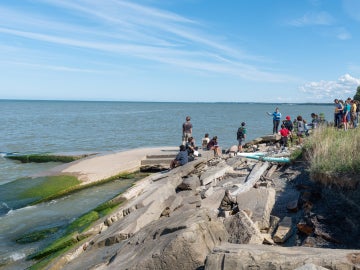Finding a Calling in Oberlin's Writing Associates Program
Ryo Adachi helps students hone their writing and speaking skills—a role she started as a student.
February 23, 2023
Ava Miller '25

Ryo Adachi graduated from Oberlin in 2022.
Photo credit: Tanya Rosen-Jones '97
Ryo Adachi cultivated interests in education and writing through a variety of peer mentorship positions at Oberlin. A 2022 graduate, Adachi came to Oberlin as as an international student. She studied math and economics with minors in linguistics and East Asian Studies and a concentration in education studies. In addition to her coursework, she gained experience as a writing and speaking associate, a Japanese conversation tutor, a teaching assistant for English for speakers of other languages (ESOL), and a peer advising leader (PAL), part of Oberlin’s support network for new students.
After graduation, Adachi started working full-time with the Writing Associates Program at Oberlin. On February 25, Adachi will facilitate an interactive workshop, “Overcoming the Comfort Zone,” in collaboration with the Office of Entrepreneurship and the Office for Disability & Access.
Read more about Adachi’s career entry in the following Q&A.
How did you develop an interest in writing and communication while at Oberlin?
Initially, it started from an interest in language education. During my first year, I was a Japanese tutor and took a class in Japanese language pedagogy. I then also took Kim Faber’s language pedagogy class, which furthered my interest in language education. As part of the class, I worked as an ESOL TA, teaching English lessons to international students. Tutoring and working with students led to being a writing associate. As I grew up bilingual, I resonated with the program’s core values that emphasized embracing language diversity.
What did you learn from your mentorship and teaching positions on campus?
I learned about the importance of reflection, especially as an ESOL teaching assistant. I originally had rigid lesson plans, but learned the importance of being flexible in my teaching. I was also informed by reflections of past experiences. Even though I’ve done a lot of workshops and presentations, I always reflect on what went wrong and how things can be improved next time. I also learned the value of building good boundaries with students. It’s possible to be sympathetic to students’ struggles while cultivating responsibility.
Which people at Oberlin had the greatest impact on your experience?
Along with cultivating an interest in language education, Kim Faber encouraged me to spend more time writing. There was a specific assignment where she complimented my writing abilities and told me I had potential as a writer. Her comment was the first time I thought about pursuing writing more seriously. She really made an impact on me, and I still see her a lot. Additionally, Tania Boster, former director of the Bonner Center, who played an important role in my college life. First as an academic advisor and then as a mentor. Tania Boster always listened to me and connected me with people on campus. She was very supportive throughout my college career.
How did you end up in your current role as the Writing Associates Program Fellow?
I first became involved in the Writing Associates Program at Oberlin in the fall semester of my third year. During my last two years at Oberlin, I was working on a lot of different projects for the program. I worked as a Writing Center writing associate, course writing associate for three different classes, and a speaking associate. With the involvement I had in the program, it made sense that I could fit into this role after graduation. Given my passion for language and writing education, I felt like this position would enhance my experience in the field.
Can you describe your responsibilities in the role?
I do a lot of logistical work in the writing and speaking centers to ensure that everyone gets the information they need. This includes training student writing associates and ensuring they are paid for their work. I also am in charge of workshop programs and outreach. I lead workshops that give writing and speaking advice that tailors to different audiences and contexts. For example, I work with the office of Fellowships and Awards to help students with personal statements for programs like the Fulbright fellowship, Truman scholarship, and Goldwater scholarship. I also work with the Office of Undergraduate Research to support students who are applying for various summer programs.
What’s next for you after this role?
Down the road, I’m very interested in working with multilingual students and international students. Finding a way for everyone to incorporate their own unique voice and tap into linguistic resources is very important to me. I’m hoping to pursue literacy education.
Do you have any advice for students interested in your position?
My advice is to keep a teaching journal and record what you are thinking before and after lessons. It’s really helpful to look back and see what changes you can make.
You may also like…
Research Roundup
Every day, Oberlin’s faculty and students produce scholarly work that uncovers new insights into how we understand the world, particularly in the areas of sustainability and the environment.
Walter Moak ’25 Earns Fulbright to Germany
The record-setting Oberlin athlete and musical studies major has earned a Fulbright English Teaching Assistantship (ETA) to Germany for the 2025-2026 academic year.
Alana Metcalf ’22 Earns Fulbright to Taiwan
The fellowship will help the psychology major achieve her goals of becoming a globally minded mental health professional.


